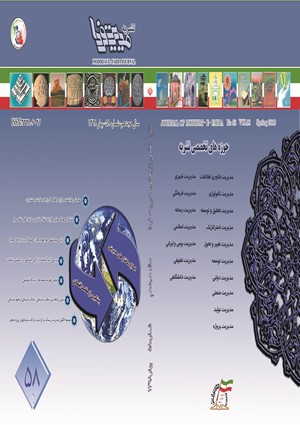Identification of Spiritual Leadership Components and its Impact on Organizational Health
Subject Areas :
Mahdi Taghvaee
1
,
Alireza Khorakian
2
,
3
![]() ,
saeed mortazavi
4
,
saeed mortazavi
4
![]()
1 - Ferdosi University
2 - Ferdosi University
3 - Ferdosi University
4 - Ferdosi University
Keywords: Spiritual Leadership organizational health Initiating Structure Altruism Principal Influence,
Abstract :
Abstract A healthy organization, with its spiritual leadership, while preserving sustainability, will in the long run creates the ability to survive and expand the organization. The research seeks to identify, in the context of universities, the components of spiritual leadership and its impact on organizational health. The research method in this study is content analysis and scrolling. In this research, entering the universities of northeastern Iran and using the interviewing tool, we discovered the components of spiritual leadership, which consists of analyzing the interviews of the experts, 11 components including transformational, psychological integrity, meaningfulness, performance feedback, organizational commitment, membership, faith, altruism, vision, value-based and social capital model were achieved at three levels: individual, group and organizational. In order to confirm the data strength in the qualitative part of this research, credibility, reliability, dependability and portability were used. In the quantitative part, for assessing the validity of the questionnaires, two methods of content validity and construct validity were used. The reliability of the questionnaires was also measured using Cronbach's alpha (Spiritual Leadership Questionnaire (0.993), organizational health questionnaire (0.775), and the results of spiritual leadership shows the health of the organization.
1. انصافپور، غلامرضا (1373)، کامل فرهنگ فارسی، 2 جلدی، تهران: انتشارات امیرکبیر.
2. پارسائیان، علی، اعرابی، محمد، رفتارسازمانی، 1385، چاپ دهم، دفتر پژوهش های فرهنگی.
3. تبریزی، منصوره (1393)، " تحلیل محتوای کیفی از منظر رویکردهای قیاسی و استقرایی" ، فصلنامه علمی و پژوهشی علوم اجتماعی (دانشگاه علامه طباطبایی)، شماره 64، صص 105-138.
4. جاهد حسينعلي(1384)، مقاله " سلامت سازماني " مجله تدبير - شماره 159.ص16.
5. جعفری، حسن ، محمدیان، مهدی، حسینپور، داود، (1391)،" رابطه¬ی سلامت سازمانی و تعهد سازمانی در کارکنان بیمارستانهای آموزشی منتخب دانشگاه علوم پزشکی جندی شاپور اهواز " ، مجله علوم بهداشتی جندی شاپور، سال چهارم، شماره 1، صص 41-48
6. دانایی فرد، حسن؛ الوانی مهدی؛ آذر، عادل (1390)، روش شناسی پژوهش کمی در مدیریت: رویکردی جامع، تهران، صفار.
7. دلاور، علی ( 1388 ). احتمالات و آمار کاربردي، تهران: انتشارات آرین.
8. سرمد، زهره، بازرگان، عباس، حجازی، الهه (1386)، "روش های تحقیق در علوم رفتاری، تهران، آگه.
9. عضدانلو، حمید (1388) "آشنایی با مفاهیم اساسی جامعه شناسی"، تهران، نی.
10. علاقه بند علي(1378)، "سلامت سازماني مدرسه"، فصلنامه مديريت در آموزش و پرورش، شماره21،ص14.
11. فردسی. لانبنورگ، آلان سی. اورنستین، 1382 ، مدیریت آموزشی(مفاهیم و عمل)، (ترجمهي محمدعلی فرنیا)، انتشارات آگاه، تهران. قهرمانی، محمد، ابوالقاسمی، محمود، عارفی، محبوبه، خاتمی، میرمحمد، (1391)، " ارزیابی سلامت سازمانی دانشکده های دانشگاه شهید بهشتی "، فصلنامه مشاوره شغلی و سازمانی، دوره چهارم ، صص 13-30.
12. معین، محمد، (1381) ، " فرهنگ فارسی" تهران، انتشارات امیرکبیر.
1. Ashmos DP, Duchon D, (2000),” Spirtuality at Work: A Conceptualization and Measure”, Journal of Management Lnquiry; 9(2): pp 45-134.
2. Bishop John, R.Schol. (2006),” Becomong a spiritual leader”, Lewis Center for Church Leadership, 5-12.
3. Creswell, J., W. and V. L Plano Clark, (2007). Designing and Conducting Mixed Methods Research, London: Sage Publication Inc.
4. Fairholm, Gilbert W. (1997). “Capturing the Heart of Leadership: Spirituality & Community in the New American Workplace”. Westport, CT: Greenwood Publishing Group, Incorporated.
5. Fornell, C., & Larcker, D. F. (1981). “Evaluating structural equation models with unobservable variables and measurement error”. Journal of marketing research, 18(1), pp: 39-50.
6. Freshman, B. (1999), “An exploratory analysis of definitions and applications of spirituality in the workplace”, Journal of Organizational Change management Vol. 12, No.4, Pp. 318-327.
7. Fry, L, W. (2003),” Toward a theory of spiritual Leadership”, The Leadership Quarterly, Vol. 14, pp. 228-256 & 693-728.
8. Fry, L, W. Vittuci, S. & Cedillo, M (2008). “Spiritual leadership and army transformation: Theory measurement, and establishing a baseline”, the leadership Quarterly 16, pp. 835-862.
9. Fry, L. W. Matherly, (2006) L. Spiritual Leadership and Organizational Performance: An Exploratory Study, pp. 1-34.
10. Gibbons p, (2001),” spirituality at work: A pre- Theoretical overview”, [MSc Thesis]. London: Birnbeck College, University of London; pp. 50-65.
11. Griffin, D.R (Ed.). (1998) Spirituality and Society: Postmodern Spiritu-ality, Political Economy and Art, Executive, No.10, pp. 8-17
12. Herold K., Siril O., Virich H., (2001), Management Principals, translated by: Mohammad Mehdi Chamran, Sharif University press, third print, Tehran[in Persian].
13. Hoy VK, Mescle C.G. (2008). Theory, research and practice in educational administration. Translated to Persian by: Abaszadeh S. Urmia: Urmia University pub: 46-88.
14. Hoy, VK. & Miskel, C.G. (1987). (2005), Educational administration, theory, research and practice, New York, MC Grow hill.
15. Kaya, A. (2015) “the relationship between spiritual leadership and organizational citizenship behaviors: A research on school principels behaviors”, Jurnal of educational sciences: theory & practices, 15(3), pp: 597-606.
16. Kinjerski Val M & Skrypnek Berna J. (2004)" Defining spirit at work: Finding common Ground " journal of organizational change management VOL17, No, 1 pp. 26-42
17. Modaff, D., Dewine, S. and Butler, J. (2008), Organizational Communication. Foundations, Challenges and Misunderstandings, Pearson, Sydney.
18. Neal, J. A. (1997). Spiritality in management education: a guide to resources, Journal of Management Education, Vol. 21, No. 1, pp. 121-231.
19. Sendjaya, S. Sarros, C. J. (2002), Servant leadership: its origin, development, and application in organization, Journal of Leadership and Organization Studies, 9 (2), pp.57-64.
20. Weinberg, F. Locander, W. (2014). Advancing workplace spiritual development: A dyadic mentoring approach. The leadership quarterly, No. 25, pp. 391-408.
21. Winkinson, D & Birmingham, p (2003). Using research instrument: A guide for research, London, Routledge.
22. Xenidis, Y. Theocharous, K. (2014). Organizational health: Definition and assessment. Procedia engineering, No 85, PP. 562-570.


